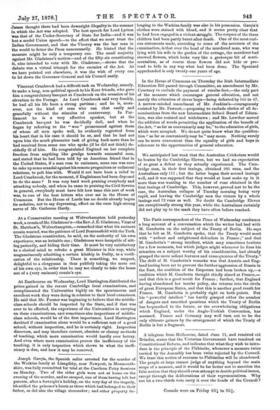Viscount Cranbrook had a difficult task on Wednesday, namely, to
make a long, non-political speech to his Kent friends, who gave him a congratulatory banquet at Cranbrook on the occasion of his elevation to the Peerage. As Lord Cranbrook said very frankly, he had all his life been a strong partisan ; and he is, more- over, not the kind of man who can chat easily and gracefully without the stimulus of controversy. In Par- liament he is a very effective speaker, but at the Cranbrook banquet he was decidedly dull, and when he began by referring to the " woe " pronounced against those of whom all men spoke well, he evidently regretted from 13jkl heart that in his case it should be so, and that he had not upon him the much pleasanter task of giving back more than he had received from some one who spoke (if be did not think) de- cidedly ill of him. He congratulated England on her complete freedom from anything like grudge towards successful men, and stated that he had been told by an American friend that in the United States, if a man rose to eminence, some one was sure to rake up some scandal against his remote progenitors or collateral relations, to pelt him with. Would it not have been a relief to Lord Cranbrook, for the moment, if Englishmen had been disposed to do the same ? It was very hard work praising everybody and attacking nobody, and when he came to praising the Civil Service in general, everybody must have felt how tame this sort of work was, to one of the best hitters who ever sat in the House of Commons. But the House of Lords has no doubt already begun its sedative, not to say depressing, effect on the once high-strung nerve of Mr. Gathorne Hardy.


































 Previous page
Previous page